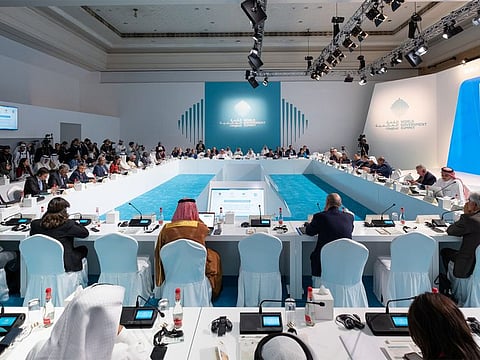World Government Summit: High-interest rates, inflation major challenges for Gulf region
Governments must tighten policies to better weather the global economic uncertainty

The regional economy today faces multiple challenges, including rising prices, high interest and inflation rates, said Abdul Rahman bin Abdullah Al Hamidi, Director-General and Chairman of the Arab Monetary Fund (AMF).
And keeping these more extensive macroeconomic conditions in mind, regional governments must tighten fiscal and monetary policies to reduce the severity of the global inflationary wave, recommended Al Hamidi on Sunday at a pre-World Government Summit event in Dubai.
Al Hamidi was among the many Arab global economic, banking and finance leaders who spoke at the seventh annual Arab Fiscal Forum.
Held in collaboration with the UAE Ministry of Finance, the forum discussed future opportunities and challenges in government financial work, harnessing all efforts to contribute to advancing the comprehensive and sustainable development process.
Al Hamidi said government economic and financial policies play a critical role in preserving social and economic stability.
Financial policy critical to economic stability
Dr Mohammed Al Jasser, President of the Islamic Development Bank Group, said financial stability is an issue faced by Arab countries in varying ways. He said: “Arab investments must be strengthened and diversified into the green economy. Moreover, support must be provided to Arab countries that suffer from crises and natural disasters to face challenges and enhance their economies.
Meanwhile, Mohamed Hadi Al Hussaini, the UAE’s Minister of State for Financial Affairs, said the forum is being organised under critical circumstances.
“Global economic challenges are rising due to rising inflation rates. By the end of 2022, inflation stood at 7.24 per cent in advanced economies and 9.5 per cent in emerging and developing economies,” said Al Hussaini. He said high inflation has its roots in both supply and demand-side factors. “The rise in inflation is driven by supply chain disruptions, geopolitical tensions and rise in food prices,” he explained.
The minister said addressing these effects requires effective global partnerships and collaboration among regional and international organisations.
“We should also continue to develop debt management capabilities and leverage local currency capital markets to support growth. We must also promote refinancing in our region,” he stated.
According to Jihad Azour, Director Middle East and Central Asia Department, International Monetary Fund (IMF), 2023 is considered the year of critical economic transformations for the Middle East. He said advanced economies will grow at 1.2 per cent in 2023, a sharp decline from 2.7 per cent in 2022, before rising to 1.4 per cent in 2024. The IMF’s recent World Economic Outlook said about 90 per cent of advanced economies are projected to see a decline in growth this year. “Moreover, inflation is peaking amid relatively low growth,” said Azour.
Sign up for the Daily Briefing
Get the latest news and updates straight to your inbox


